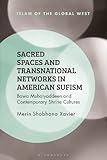Sacred spaces and transnational networks in American sufism : Bawa Muhaiyaddeen and contemporary shrine cultures / Merin Shobhana Xavier.
Material type: TextSeries: Islam of the global westPublisher: New York : Bloomsbury Academic, 2018Description: 1 online resourceContent type:
TextSeries: Islam of the global westPublisher: New York : Bloomsbury Academic, 2018Description: 1 online resourceContent type: - 9781350026704
- 1350026700
- 9781350026698
- 1350026697
- Muhaiyaddeen, M. R. Bawa
- Muhaiyaddeen, M. R. Bawa
- Sufism -- United States
- Islamic shrines -- United States
- Soufisme -- États-Unis
- Sanctuaires musulmans -- États-Unis
- Islamic worship, rites & ceremonies
- Social & cultural anthropology, ethnography
- Sufism & Islamic mysticism
- RELIGION -- Islam -- General
- Islamic shrines
- Sufism
- United States
- 297.40973 23
- BP188.8.U6 S46 2018eb
- online - EBSCO
| Item type | Current library | Call number | URL | Status | Notes | Barcode | |
|---|---|---|---|---|---|---|---|
 eBook
eBook
|
Biblioteca "Angelicum" Pont. Univ. S.Tommaso d'Aquino Nuvola online | online - EBSCO (Browse shelf(Opens below)) | Online access | Not for loan (Accesso limitato) | Accesso per gli utenti autorizzati / Access for authorized users | (ebsco)1703267 |
Includes bibliographical references and index.
Charting Bawa's ministries from Jaffna to Pennsylvania -- From the ashram to mankumban: everyday practices amongst Bawa's Sri Lankan followers -- From the masjid to the mazar: rituals and spaces in the American fellowship -- Women in Bawa's ministries from Jaffna to Pennsylvania -- Swami to qutb: Bawa as al-insan al-kamil.
Print version record.
"This book sheds light on the Bawa Muhaiyaddeen Fellowship (BMF), one of North America's major Sufi movements, and one of the first to establish a Sufi shrine in the region. It provides the first comprehensive overview of the BMF, offering new insight into its historical development and practices, and charting its establishment in both the United States and Sri Lanka. Through ethnographic research, Sacred Spaces and Transnational Networks in American Sufism shows that the followers of Bawa in the United States and Sri Lanka share far more similarities in the relationships they formed with spaces, Bawa, and Sufism, than differences. This challenges the accepted conceptualization of Sufism in North America as having a distinct "Americanness", and prompts scholars to re-consider how Sufism is developing in the modern American landscape, as well as globally. The book focuses on the transnational spaces and ritual activities of Bawa's communities, mapping parallel shrines and pilgrimages. It examines the roles of culture, religion, and gender and their impact on ritual embodiment, drawing attention to the global range of a Sufi community through engagement with its distinct Muslim, Hindu, Jewish, and Christian followers."--Bloomsbury Publishing


